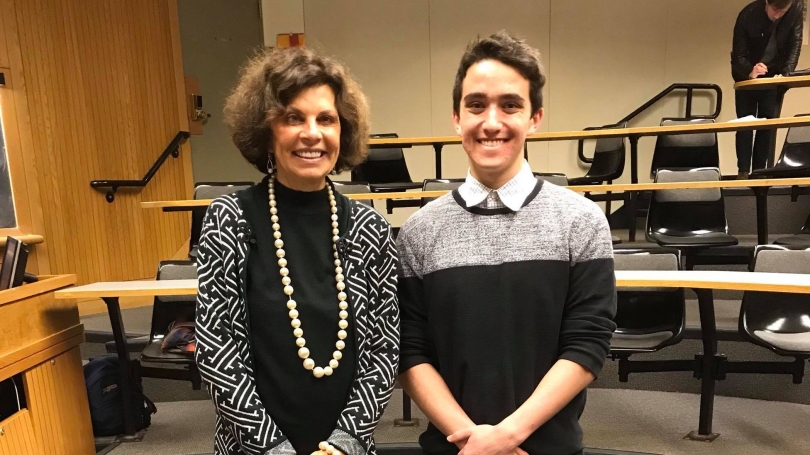
Menu
- Public Policy
- Leadership
- Funding
- News & Events
- About the Center
Back to Top Nav
Back to Top Nav
Back to Top Nav
Back to Top Nav
The Dartmouth Open Campus Coalition, in co-sponsorship with the Rockefeller Center, College Democrats, and College Republicans, recently hosted New York Law School Professor Nadine Strossen, who shared her knowledge of free speech on college campuses and her experience as the former President of the American Civil Liberties Union.
The Dartmouth Open Campus Coalition seeks to bring together a diverse group of students and scholars to discuss issues that are crucial to our society and communities. At a center of inquiry, such as Dartmouth College, it is our responsibility, as students and truth seekers, to challenge our perspectives and beliefs. This is only possible if free inquiry and viewpoint diversity are encouraged. Yet, we also have many questions on free speech, such as does freedom of speech conflict with a commitment to equality? We wrestle with these timely questions and many others.
On a Thursday afternoon, students and community members gathered to discuss free speech, viewpoint diversity, and social justice. Professor Strossen, who has been highly engaged on the campus circuit, answered questions and gave audience members a chance to participate and offer their own opinions.
In an interview with Dartmouth College Radio, Professor Strossen discussed that, in her law school classes, she insists that all students are able to argue all possible and plausible perspectives. “If they advocate one view, I make them turn around and advocate the opposite view. You can’t be an effective lawyer without doing that... [While] nobody has a legal duty to engage in dialogue, we have a moral obligation to ourselves and to our community.”
How can students support free speech and individuality at Dartmouth? “Search for common ground [and listen]. We have two ears and one mouth: we should do even more listening than we do talking. People do not hear the ideas that speakers they think they’re going to disagree with have to offer, therefore depriving themselves of very valuable education opportunities.”
Students asked about how free and open discourse can occur when topics are so emotionally charged. Questions were also proposed from a nonacademic setting, such as one regarding whether private businesses should be allowed to fire employees for their speech inside and outside of the workplace. Students also asked about the acceptability of history lecturer Mark Bray’s antifa remarks and of Professor Duthu's anti-Israel views. Joseph Asch, of Dartblog, attended the event and posed questions about the current anti-free speech rhetoric. There was some discussion about whether or not professors should deliberately call on minority students so that their voice can be heard.
Nadine strengthened her views in support of social justice, while pointing out that many of the recent attempts to further liberal goals have taken the wrong approach. “Freedom of speech is the greatest ally for social justice and censorship is the greatest enemy,” she said. Exposure to ideas that make us uncomfortable is better for us than protection from these ideas. After the lecture and Q&A concluded, many students remained to ask questions and continue these conversations; as the Valley News described it, this was truly an evening of “a cordial, thoughtful exchange of ideas.”
-Submitted by Rachna Shah '21, Rockefeller Center Mini Grant Recipient
The Rockefeller Center's Mini-Grants program funds registration fees for students attending conferences, as well as the costs of bringing guest speakers to Dartmouth. The views and opinions expressed here are the author’s own and do not necessarily represent the views and opinions of the Rockefeller Center or constitute an endorsement by the Center.